Introduction:
As fitness enthusiasts, you are constantly seeking ways to improve your performance, build more muscle, and recover faster from gruelling workouts. You’ve likely heard of protein’s pivotal role in muscle growth and recovery. Traditionally, animal-based foods are revered for their high protein content. However, an increasing number of athletes are turning to plant-based diets for their nutritional needs. Undoubtedly, you’re curious about this shift and its potential impacts on strength performance and recovery in bodybuilding. This article delves into the effects of plant-based diets on your physique and training outcomes.
Also read : How to Develop a Comprehensive Injury Surveillance System in Professional Sports?
The Role of Protein in Muscle Building and Performance
Introducing the topic:
Protein is undeniably one of the most essential nutrients for bodybuilders and athletes. Its role in muscle building, performance, and recovery is pivotal. Here, we will explore how protein contributes to these aspects and why it’s essential in your diet.
This might interest you : How Can Athletes Use Social Media to Build a Positive Personal Brand?
Protein is the building block of muscles. During workouts, muscle fibres endure microscopic damages, and it’s the protein from your diet that aids in repairing and rebuilding these fibres, leading to muscle growth. Moreover, protein is instrumental in maintaining muscle mass, particularly during weight loss phases where the body may resort to muscles for energy in the absence of adequate dietary fat and carbohydrates.
Additionally, protein plays a role in enhancing workout performance. Studies show that protein supplementation can improve exercise performance, strength, and muscle size. It aids in maintaining energy levels during prolonged training sessions, thus allowing you to push harder and achieve your fitness goals.
Plant-Based Diets – An Overview
Introducing the topic:
Plant-based diets are gaining popularity among athletes and bodybuilders. But, what does eating plant-based mean? And does it provide all the necessary nutrients for muscle building and performance?
A plant-based diet primarily consists of foods derived from plants, such as fruits, vegetables, whole grains, legumes, nuts, and seeds, with little to no animal products. There are different forms of plant-based diets, ranging from strictly vegan diets (no animal products) to vegetarian diets (includes dairy and eggs) and flexitarian diets (mostly plant-based but occasional meat).
One major concern about plant-based diets is whether they provide enough protein to support muscle growth and exercise performance. It’s a common misconception that plant-based foods lack sufficient protein. On the contrary, numerous plant-based foods, including lentils, tofu, tempeh, quinoa, and hemp seeds, are rich in protein. They also contain a plethora of other essential nutrients, such as dietary fibre, antioxidants, and vitamins, contributing to overall health and wellbeing.
Plant-Based Diets for Strength and Muscle Growth
Introducing the section:
Can you build muscle and strength on a plant-based diet? This section addresses this question, focusing on scientific evidence and practical implications for bodybuilders.
A study published in the American Journal of Clinical Nutrition found that muscle and strength gains are not influenced by protein source when protein intake is controlled for. In other words, as long as you get enough protein, it doesn’t matter whether it comes from plants or animals. A systematic review also found that plant-based diets were associated with equal strength and muscle mass compared to omnivorous diets.
Moreover, plant-based diets can offer additional benefits for muscle growth. They are rich in dietary fibre and antioxidants, which can reduce inflammation and promote faster recovery post-workout. Furthermore, plant-based diets are typically lower in fat, which can enhance body composition and reveal muscle definition.
Plant-Based Diets for Recovery and Exercise Performance
Introducing the topic:
Now that we’ve established plant-based diets can support muscle growth and strength, let’s explore their impact on recovery and training performance.
Exercise causes oxidative stress and inflammation in the body, slowing down recovery and potentially affecting subsequent workouts. However, plant-based diets, rich in antioxidants and anti-inflammatory compounds, can counteract these effects. A study found that athletes on a plant-based diet reported faster recovery times and less muscle soreness.
As for exercise performance, a plant-based diet can be just as effective, if not more. A study published in the Journal of the International Society of Sports Nutrition found that a vegan diet could provide benefits for cardiorespiratory fitness and endurance performance. Moreover, plant-based diets are high in carbohydrates, the primary energy source during exercise, which can enhance training intensity and duration.
Making the Transition – Tips for Bodybuilders
Introducing the topic:
While evidence supports the efficacy of plant-based diets for bodybuilding, making the transition could be a challenge. Here are some tips to help you navigate the shift.
Firstly, it’s crucial to plan your diet to ensure you’re getting enough protein and other essential nutrients. Diversify your protein sources to get a variety of amino acids, the building blocks of protein. Include protein-rich plant foods like legumes, tofu, tempeh, and seitan in your diet.
Secondly, remember that plant-based diets are typically high in fibre, which can be filling and potentially limit your overall food intake. Thus, you might need to consume larger volumes of food to meet your energy needs.
Lastly, consider consulting with a dietitian or nutritionist experienced in plant-based diets. They can provide personalized advice based on your specific needs and goals.
Overcoming the Myths – Busting Common Misconceptions
Introducing the section:
Let’s now discuss some common misconceptions about plant-based diets and bodybuilding, and how to counter them with factual information.
One of the most persistent myths about plant-based diets is that they can’t provide enough protein for muscle building. However, research has shown that plant-based protein sources, such as lentils, tofu, and tempeh, can provide sufficient protein to support muscle growth and performance. In fact, a study found that protein intake from plant sources was associated with similar muscle strength and size compared to animal-sourced protein when total protein intake was controlled for.
Another common misconception is that plant-based diets lack essential amino acids. While it’s true that most plant foods are incomplete proteins (lacking one or more essential amino acids), this doesn’t mean you can’t get all essential amino acids on a plant-based diet. By consuming a variety of plant foods throughout the day, you can get all the essential amino acids your body needs.
The notion that plant-based diets can’t support strength training and resistance exercise is another misleading myth. As discussed previously, research has demonstrated that plant-based diets can be just as effective, if not more, for building muscle strength and endurance performance.
Lastly, there’s a misconception that plant-based diets can lead to deficiencies in nutrients like iron, calcium, and vitamin B12. It’s important to note that while these nutrients are abundant in animal products, they can also be found in plant-based foods. Spinach, broccoli, and fortified plant milks are good sources of calcium; iron can be found in lentils, chickpeas, and tofu; and vitamin B12 can be obtained from fortified plant foods and supplements.
Conclusion: Embracing Plant-Based Diets for Bodybuilding
Wrapping up the topic:
In conclusion, plant-based diets can be a viable option for bodybuilders and athletes. They provide enough protein for muscle growth, ensure faster recovery times, and may even enhance exercise performance. The key is to ensure diversity in your food choices to meet all your nutritional needs.
Transitioning to a plant-based diet does require planning and adaptation. However, the benefits, such as improved health, better recovery, and potentially enhanced performance, can make the effort worthwhile. Ignore the myths and focus on the facts: a balanced plant-based diet can support your bodybuilding goals just as effectively as an omnivorous diet.
As more research emerges in this area, it is likely that more athletes and fitness enthusiasts will embrace plant-based diets. Whether you’re considering a vegan diet or just aiming to include more plant-based foods in your meals, the future of bodybuilding may indeed be greener than we think.
















